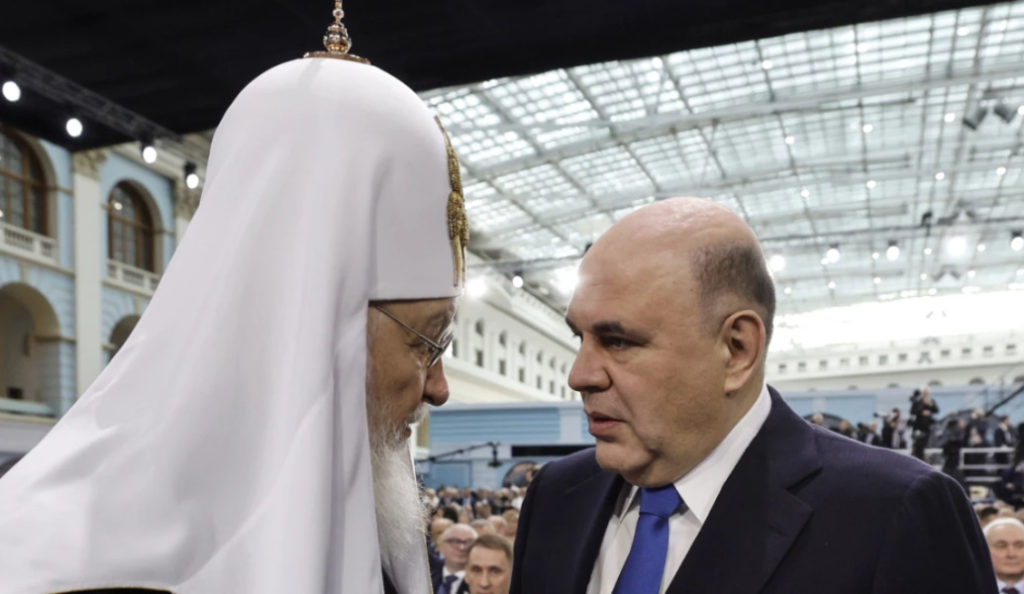Russian Orthodox Patriarch Kirill is not an “authentic theologian,” according to a senior Republican senator who encouraged trans-Atlantic allies to sanction the cleric for blessing Russia’s war in Ukraine. “The patriarch has urged Russians to side with the persecutor over the persecuted,” Sen. Roger Wicker (R-MS), the ranking member on the Senate Armed Services Committee, said in a message to the U.S. Commission on International Religious Freedom. “No authentic theologian would endorse such flagrant violations of human rights. In fact, it is appropriate for the United States and European partners to consider whether Kirill himself should face sanctions” — reports Washington Examiner.
“President Putin has leveraged the religious nationalism of the Russian people for his own cause. He has framed the war in religious terms, and set his own people against Ukraine,” Wicker said, naming Kirill as one of Putin’s “most prominent propagandists.”
The jurisdiction of Orthodox churches in Ukraine has emerged as a major controversy throughout the war in Ukraine. Putin has invoked the shared religious heritage of Russian and Ukrainian people to justify his hegemony in Ukraine, but the Istanbul-based Patriarch Bartholomew of the Ecumenical Patriarchate of Constantinople — the senior patriarch in the global Orthodox communion — approved the formation of an autonomous Orthodox Church of Ukraine in 2019, five years into the war.
The two church bodies operated in parallel, but Russia’s initiation of a campaign to overthrow the Ukrainian government over the last year spurred hundreds of Orthodox parishes to cut ties with the Moscow Patriarchate. Ukrainian President Volodymyr Zelensky also has moved to evict the Ukrainian Orthodox Church of the Moscow Patriarchate from Kyiv Pechersk Lavra, an ancient monastery that sits on government property, and transfer it to the control of the Kyiv-based Orthodox Church body.
The religious freedom hearing put a spotlight on Moscow’s abuse of religious minorities in Russia and Ukraine. One expert endorsed sanctions on “the leadership of the Russian Orthodox Church and Moscow Patriarch Kirill personally” on the grounds that they are complicit in religious freedom abuses. That same witness warned Zelensky not to ban the entire church body, however.
“On the one hand, religious freedom is not in any way an excuse for calls to violate state sovereignty or territorial integrity, or for collaboration with Russian military forces,” said Dmytro Vovk, a Ukrainian law professor and adviser to the Organization for Security and Cooperation in Europe. “On the other hand, international human rights standards emphasize that while counteracting national security threats, the government should focus on concrete individuals involved in illegal activities, not on the whole religious group or religion in general.”
“These restrictions and repressions have been accompanied by numerous acts of pure violence committed by the Russian military and paramilitary groups,” Vovk said. “[S]ince February 2022, the Russian military destroyed and damaged about 500 religious buildings. A bitter irony is that almost a third of these buildings belong to the Ukrainian Orthodox Church, historically and ecclesiastical affiliated with the Moscow Patriarchate.”
Vovk and other witnesses characterized the most recent wartime predations as an extension of the religious freedom abuses underway in occupied Crimea. Russian officials use counterterrorism laws to target members of religious organizations that refuse “to prosecute activists and believers outside the religious organizations recognized by the Russian authorities,” as an anonymous activist from Crimea’s Tatar Muslim community said in a statement submitted to the commission. Those tactics were used against Jehovah’s Witnesses in Russia, as one former prisoner of conscience attested.
“Sometimes, the police came unannounced to our meetings and filmed all those who attended. I could not really understand, at that time, why they were doing all this. … But it soon became clear to me,” said Dennis Christensen, a Danish citizen and Jehovah’s Witness who received a six-year prison sentence in 2019 after two years of pretrial detention.
Christensen described how he was targeted even after a judge and prosecutor agreed that he should be released from prison on parole.
“But I wasn’t released. The administration sent me the day after to punishment cells,” he recalled. “And there, I found out that the prosecutor had appealed his own decision and demanded a new trial. At that time, I could understand that the orders came from high above, from Moscow, and that they were not playing fair play. And I was not going home before time.”
Such prosecutions reflect an attempt “to annihilate civil society,” according to another human rights expert.
“The authorities are deeply suspicious of institutions, be they nongovernment organizations, political parties, or religious confessions, that they do not control,” Human Rights Watch Deputy Director Rachel Denber said during the hearing. “If the government cannot control a religious community, the impulse is to deem it a threat to ‘Russian traditional values.'»
Patriarch Kirill has said that Russian soldiers who die fighting in Ukraine will have their sins forgiven by God — “this sacrifice washes away all the sins that a person has committed,” he has said of death in battle — as he maintains that the war is a defense of a “Russian world” that stretches across national boundaries.
“Today, Donbas is the front line of defense of the Russian world,” Patriarch Kirill said in December. “And the Russian world is not only Russia — it is everywhere where people who were brought up in the traditions of Orthodoxy and in the traditions of Russian morality live.”
That posture has deepened a rupture between the Moscow Patriarchate and the Ecumenical Patriarchate.
“What is still more painful to us is the fact that the Patriarchate of Moscow has stooped to the level of submitting to political ambitions of the Russian Federation, even endorsing and seemingly blessing this cruel invasion and unjustifiable bloodshed,” Patriarch Bartholomew has said. “We hope that someday the Moscow Patriarchate will also recognize that unity is not enforced by domination, but only embraced in freedom.”

